|
DAY SEVEN John 4:1-26
Becky Kent, Morrisville United Methodist Church Well, Well, Well... When Jesus met the Samaritan woman at the well, she had no idea who he was; but the Lord knew her; still he asked her for a drink of water. He told her that if she knew God and who He was, she could have asked him for a drink and he would have given her living water. Jesus did not avoid her or judge her because of her past or her present situation. He offered her the "living water" knowing all about her. He didn't mind that she was a Samaritan or that she was currently living in sin. He reached out to her, and offered her the living water and shared with her that it didn't matter where people worship but rather what kind of worshipers they are. And then he went on to tell her "I who speak to you am he". How do we act towards other sinners? Do we avoid or shun them? Do we force them to hide in the shadows? Do we remember that we too are sinners? Can we accept others without judgment, the way that Jesus did? Action Step: Step out of your comfort zone....speak to someone that you would normally avoid. Give a dollar or spare change to the person asking for it, or pay for the groceries for the person in front of you...even if they do have food stamps. Prayer: Lord, Thank you for all of your many blessings. Please help us to be like you and reach out to those who need us and our help. Help us to not judge others but to try and see them as you do. In Jesus name. Amen.
0 Comments
DAY Eight John 4:27-54 Joel Estes,
Grace Presbyterian Church, Pennington NJ Harvest in Plain Sight The disciples find Jesus talking with a Samaritan woman. They know nothing of the conversation they have just had - how utterly life-changing it was, how full of mystery and revelation. They do not perceive the living water that is flowing beneath the rim of their mundane concerns. Instead, all they think is their master is associating with a person they would rather not. They do not see what Jesus sees. They have not learned to "look." The disciples wonder if Jesus is hungry. They don't perceive that, while they have been out searching for food, he has been feasting on the will of his Father. "My food is to do the will of him who sent me and to complete his work," he tells them. And what is that work? It is the work of the harvest. Look up, Jesus says, the harvest is before you, if only you have eyes to see. The harvest comes in the form of a person we'd rather not rub shoulders with - a person we dislike, devalue, or with whom we disagree. The harvest involves outsiders, Gentiles beyond the bounds of Jewish piety who, nevertheless, exhibit extraordinary faith. Outsiders are seen by Jesus, are recipients of his love, are transformed by his grace, and become witnesses of his power. Because of the Samaritan woman, an entire town comes to faith. And it all happened because Jesus saw what was hidden in plain sight: a harvest ripe before his eyes. Who do we encounter everyday, but don't really see? Where is our harvest in plain sight? Action Step: "Look around you," Jesus says. Take a moment and reflect on the people around you in your life. Consider especially those you find difficult to be around. How can you be a witness of God's grace and an agent of God's love to them? Ask God to show you one way you can do that today, and then commit to obeying God's call, taking on the attitude of Jesus "to do the will of him who sent me and to complete his work" (v. 34). Prayer: God, give me eyes to see the harvest all around us. Give me grace to love those I find hard to love. Give me faith to believe you can transform anyone into a witnessing disciple, even me. Give me a desire for your will that is stronger even than my need for food. Use me to do your work, in your way, for your glory. Amen.  DAY THREE John 2:1-12 Madeleine Jones, Holy Trinity Roman Catholic Church Service always done in the name of Jesus. "They have no wine." "Do whatever He tells you." Any wedding takes careful planning and preparation. Yes, the Feast is a Celebration but it also consists of service for both the Bride, the Groom, and for the guests. At times, an action of service may come from a guest, as at the Wedding Feast of Cana, when the Mother of Jesus recognized that there was no more wine. Jesus was called upon by His Mother to be of service even though Jesus was still living a hidden life. How often do we put others before ourselves? Always, sometimes, never? At times, we may feel last, inferior, insecure, hurt, ill and yes the list always seems to grow. We are told to visit the sick, those in prison, to feed the hungry, to shelter the homeless. Do we do this? Jesus could have remained hidden; however, He was aware of a greater need, a need to show kindness and to be of service to others. In the second half of Chapter 2 of John, we see Jesus performing another type of service. This time to His Father, in driving out money-changers from the Temple. Action Step: Service opportunities are among us daily, whether it is an act of gentle kindness or an act of justice. We need to step out of our hidden life and into the life of Christ. Prayer: Oh Lord, in Your name, may we always have the courage to be Your Servants. Amen.  John 1:29-50Sharon Taylor, The Lutheran Church of the Resurrection The word "evangelism" makes many good Christians nervous. Perhaps it is because when we think of witnessing our faith to others we think of strong-arm tactics and Bible-quoting sales pitches. We think that making disciples is forcing faith in Jesus on others and convincing them why they must believe like we do. Yet, in the Gospel of John, we are given a very different picture of evangelism. The word itself comes from a Greek word that simply means "good news". Witnessing is simply sharing the good news of what God has done, and is still doing, in Jesus Christ. Evangelism is a pointing to God's grace and mercy. Evangelism is pointing to the source of our hope and trust. It is an invitation offered in love. In our passage, John first models this for us. John the Baptist has his own little group of followers by now. Yet, he is clear to say that he is not the one for whom they have been waiting. So when the time is right, John points to Jesus, literally, and says, "Behold the Lamb that takes away the sin of the world". John says, "Here he is!" John points away from himself to Jesus, and that's when it all begins. Once they are looking at Jesus they become intrigued and the invitation is given. They ask Jesus, "Where are you staying?" He replies, "COME AND SEE." With that, the word began to spread. The excitement began to spread. Andrew told Simon. Philip told Nathanael. And when Nathanael's response was less than enthusiastic, Philip simply says, like Jesus did, "COME AND SEE" This simple invitation is our calling. Someone pointed us to Jesus at some time in our lives. It may have been your parents, grandparents, a neighbor or a classmate. It may have been a friend who asked you to make quilts for refugees. When is the last time you pointed someone to Jesus? When is the last time you saw God working in your daily life and shared that with someone? When is the last time you invited someone to COME AND SEE? Our life in faith is a two-sided coin. One side says COME AND SEE. The other side says GO AND TELL. As we prepare for The Church Has Left the Building, let us remember both. Action Step: Reflect on who in your life you need to say "come and see." Prayer: Dear Lord, please keep our eyes and ears keen to whom we need to point to you. Amen. 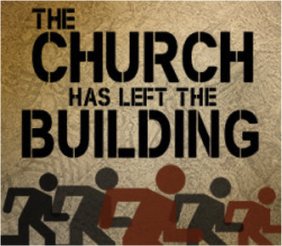 Welcome to Love the World: The Church Has Left the Building One Sunday a year, a growing number of congregations launch out to be Jesus' hands and feet in countless community projects. What started in 2010 with Woodside Church in Yardley, PA is mushrooming into a movement of congregations. The movement engages all ages in projects that bless local communities. In a single day, they stock pantries, deliver books to inner--city--school libraries, clean up the environment, lead worship for people in recovery, make meals for the homebound, build shelters for the homeless, sew dresses for Haiti, and so much more. It is truly a taste of heaven. The day is really the culmination of 40 days of prayer, Bible reading, sermons, and small-group Bible studies. As we read about Jesus loving the lost and healing the hurting, momentum builds toward the day when we go out and follow in his steps. Our theme is "Love the World: The Church Has Left the Building." Based on John 3:16, our outreach this year will focus on the way Jesus loved individuals in the Gospel of John. All the devotionals in this booklet are meditations on the book of John, encouraging us to love in Christ's name. On Sunday, May 17, 2015, United Presbyterian Church will leave the building following worship to love the world in Jesus' name! We hope you will be inspired by this devotional to join us. DAY ONE John 1:1--28 Carolyn Edwards, Faith Lutheran -- Northeast Philadelphia Where do you see Jesus? As a life--long Lutheran, I have heard and read verses 1 thru 5 of this passage more times than I can remember, and yet than as I read it again for this exercise, I have to read it more than once before it sinks in. With some help from my interpretive Bible, I learn that the Jews used the term 'the word' as an expression of God's wisdom. Now it starts to make sense, reminding me of what I have always known: In the beginning was God, who gave us the Light, which was Jesus. So if people want to know God, they can look to Jesus. If people want to know Jesus, they can look to his followers. My Pastor once posed the question, 'Where do you see Jesus?' As we kick off these days of prayer leading up to May 17th, I think it is more important to ask "Do people see Jesus in you?' In a few short weeks, we will be taking our faith out into our communities. What a perfect opportunity to show our friends and neighbors what Jesus was like! Action Step: Prepare your heart, mind and body in the weeks leading up to May 17th. Prayer: Lord, help us to see Christ in others, and to show Christ to our world. Amen. DAY FOUR John 2:13-25 Michael Capron, Hopewell Presbyterian Church
What was Jesus so angry about? When I get to the movie theater, I have to buy a ticket and cannot bring in any outside food or drink. If I can't afford it, I don't see a movie and I go hungry & thirsty. When I come to Christian worship, I don't have to pay anything and they serve me the Lord's Supper for free (probably coffee hour goodies too!) I don't think Jesus is angry about people doing business in church, or even turning a profit. It isn't about the money. It is about worship. They were holding worship hostage for those who could afford to pay. This is the reason he is especially angry at the sellers of doves--those were the animal sacrifices that very poor people offered. For interesting comparisons, read Mark 12:41-44 and Matt 17:24-27. Action Step: What barriers are in your worship space that would keep newcomers away? Prayer: Lord God, help me to offer my whole self to you in worship: my attention, my mind, my praise, my talents and my money. Amen.  Israel was a dysfunctional family just like many of ours. In today’s story, the father, Jacob, has made the classic error of favoring one son over the others as symbolized in the long robe with sleeves he made for him. Apparently sleeves were a big deal back in those days. This would be like my parents buying me a Baracuda after having made my three sisters drive my car when it was available. Wait a minute, that is what happened in my family, only my parents bought my sister, Anne, a car and let me use it when it was available. You get my point. Every family has its problems, and no parent is fair all the time. Anyway, Jacob’s other sons had taken their family flocks from the Valley of Hebron, where they lived, north to Shechem. This was a distance of 60 miles north and would have taken them through what is today the disputed territory of the West Bank. Why go 60 miles? Was the flock so big it ate that much grass? More likely they went to where the water was. Joseph’s brothers are infuriated when they see the fancy robe that Jacob made for Joseph. They proceed to throw Joseph in an empty well and then sell him into slavery. So much for brotherly love. With a family like this how could God possibly accomplish anything? Take heart, o fellow member of a family dysfunctional. As we know, God used this episode for great good in the larger story. Joseph will later say to his brothers, “What you intended for evil, God intended for good.” The Spirit’s presence and intercession lead to God’s purpose being accomplished through the dysfunctional family which is us. In the same way, Paul tells us in Romans 8, We know that all things work together for good for those who love God, who are called according to his purpose. ALL things work together for good. That’s a pretty encouraging thought. God in his sovereign grace is intent on making things work out, no matter how badly we’ve messed up. Just think about this for a minute.
You may have seen me weeding in the church garden and wondered, "What is Pastor Jean doing there? That's not her job!"
I have my reasons. The most basic reason is it needs to be done. And in doing what needs to be done, I get to follow in the footsteps of our Savior. If Jesus saw a need, he responded to that need. Do you remember when Jesus healed the blind man on the Sabbath? What did the Pharisees and Sadducees think? He should be preaching on the Sabbath, not "working." But Jesus saw a need, he responded with compassion, and he healed the blind man. If we have the humility of Christ, who left his heavenly home to save the likes of us, then no job is beneath us if it needs to be done. Another reason I like to work in the church garden is it gives me a chance to count my blessings. Whenever I am weeding, I am astounded at how fertile the Garden State is. God provides an abundance of sunshine and rain, warmth and nutrients in our corner of the world, so that we are showered with bumper crops practically every year. I also think about what a privilege it is to be able to do this work. In 3 weeks I will turn 60 years old, yet all my parts are still working pretty well! I can kneel to pull out weeds. I can see the beauty all around me. I can smell the flowers and hear the birds (not as well as I used to, but I can still do it!). I can taste the produce that comes from the earth. When you consider all the things God had to do to make this world a paradise of beauty and a cornucopia of abundance it is awesome, in the classic sense of the word. But the most important reason I like to weed the church flower beds is because it allows me to honor God. The Psalmist wrote, "A day in your courts is better than a thousand elsewhere. I would rather be a doorkeeper in the house of my God than live in the tents of wickedness" (Psalm 84:10). The church is the house of God and deserves loving care. There is nowhere on earth I would rather be. To be on my knees in the Prayer Garden is about as close to heaven as I am going to get. As Dorothy Frances Gurney puts it: Kiss of the sun for pardon. Song of the birds for mirth. You're closer to God's heart in a garden Than any place on earth. 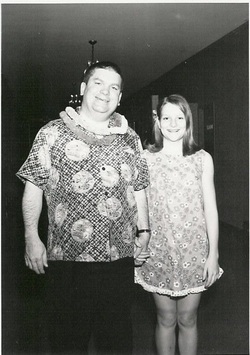 There have been many people who have profoundly influenced my faith, but none more than my father, Richard Benefield, aka "The Jolly Fat Man of the Hotel Magee." Dad was a hotel manager and caterer whose worked tirelessly 7 days most weeks. He prepared me for the minister's life by working every weekend. But for him, work was not the center of his life, faith was. My Dad's favorite verse of the Bible was Romans 12:1: "I appeal to you therefore, brothers and sisters, by the mercies of God, to present your bodies as a living sacrifice, holy and acceptable to God, which is your spiritual worship." He found his particular calling later in the chapter, "We have gifts that differ according to the grace given to us: prophecy, in proportion to faith; ministry, in ministering; the teacher, in teaching, the exhorter, in exhortation; the giver, in generosity; the leader, in diligence; the compassionate, in cheerfulness." God gave my Dad and abundance of most these gifts, though he considered he was especially blessed to be a generous giver. One of the things my Dad used to say, which has been a guiding light for my own life, is: "If you love to serve others, you will always have something important to do and you will always be happy." He loved to serve his church, his community, and God's creation, and it made him a very happy man. I remember when I was 12 years old, I went to the First Presbyterian Church of Bloomsburg, PA, for a worship service in which my Dad, an elder of that church, was installed as Moderator of Northumberland Presbytery. On Tuesday night, when I was installed as Moderator of Monmouth Presbytery, surrounded by my family and so many wonderful friends from United Presbyterian Church and the Monmouth Presbytery, I knew that my Dad was one of that "great cloud of witnesses" cheering us on from heaven (Hebrews 12:1). My father was the one who helped light the torch of my faith, the Light of Christ that illumines my path in life and inspires me to share Christ's love and light with others. My prayer is that we might be the kind of Christians whose love for Christ and service for others inspires generations to come, just as my father's did.  Acts 1:6-14 This passage in Acts is about the Ascension of Christ into Heaven. Ascension Day is forty days after Easter – and ten days before Pentecost. And, of course on Pentecost we celebrate the out pouring and indwelling of the Holy Spirit – the act by which God empowered the church for its mission in the world. In contrast, this Scripture passage involves a period of waiting -- It is a short and unusual time for the fledgling Christian community: Christ has ascended into heaven – His earthly ministry has been completed. But the Holy Spirit has not yet descended upon the church to empower it and inspire its mission. The fledgling Christian community is not yet the church in a real sense – that will not happen until Pentecost. Instead – we see a small group of believers waiting for God – waiting for help and his instruction about what to do next in life. I think we have all been in a situation like that. What do you do when you are waiting for God to act? Here are some thoughts on how we can faithfully wait for God. First, hold onto the promises of the Scripture: God will act in His time. Jesus told the disciples: “It is not for you to know the times or the dates that the Father has set by his own authority.” It is hard to wait. We do not want to wait. We want to speak with God on our time – not on his. We want him to act – Now!!! We want God to act on our time – not on His. God will act – He always does – In his way – In his time – In His wisdom. Isaiah the Prophet reminds us: “As the rain and the snow come down from heaven and do not return to it without watering the earth and making it bud and flourish, so that it yields seed for the sower and bread for the eater, so is my word that goes out from my mouth: It will not return to me empty, but will accomplish what I desire and achieve the purpose for which I sent it. And you will go out in joy and be led forth in peace.” Isaiah reminds us that the Lord has his time. The Lord will act in his time. The Lord will restore all things in his time. Second, waiting for God should be a time of practical activity. The Book of Acts tells us that the disciples took care of some business. After Christ had ascended, Peter tells the disciples that they needed to replace Judas – to appoint a new disciple. So, they went about in a business-like fashion – They created a job description: The new disciple was to be a witness to the resurrection of the Christ. They specified the qualifications: The new disciple had to be a person who had been with them from the beginning. The disciples then looked at the candidates: There were two who fit the bill. Finally, the disciples took the practical step of invoking God in their decision making process: By casting lots they allowed God to chose between the two qualified candidates. Our own times of waiting for God should also be a very practical time. If we are waiting for God to solve the problem of starvation in Africa – we can also be doing something practical: We can give what we are able; we can support those who are there in Africa to bring relief; we can pray like the disciples. All of those things are very practical. If we are waiting for God to provide direction in our life activities – we can do something very practical while we wait: we can investigate our options; we can get the proper training; we can talk to other people, listening to their suggestions; e can pray for guidance. All of those things are very practical. Third, the time of waiting should be a time of reflection. I imagine that the disciples used the ten day period from the Ascension to Pentecost for reflection on all of the events they had witnessed and experienced. Imagine for a moment that you are Peter. I imagine Peter during this time of waiting like this: God has promised that there will be great things in the future. But for now Peter is waiting for the Holy Spirit. Perhaps Peter thought back on his time with Jesus. Time and again, the Gospels tell us that along the way there was so much that Peter did not understand. Peter made mistakes; he was confused. And yet for all of the mistakes that Peter made, Christ still trusted him. Christ was still determined to use him. Peter had so much to contemplate. It was necessary for Peter to have that time of reflection before he went on to the next big set of assignments that God had in mind for him: leading the Jerusalem church, converting Gentiles, traveling to Rome to lead the church there, to become the first bishop of Rome, and going to a martyr’s death. The waiting time provides a wonderful opportunity to stop, to reflect, to gain some perspective on what has happened in life. Finally, the time of waiting can be a time to deepen our faith. That gets us to the final example set for us by Peter and the other apostles. God helps us build faith in many ways, but one way is in our communion with the Lord and with each other. As they began their period of waiting – the days between Ascension and Pentecost – they ate with our Lord. They heard our Lord and were built up in their faith in this communal experience. And in the same way faith is built in us in the sacrament of communion. As we wait for the Lord to act within our lives, let us wait with him and with the Body of Christ as we come to the Lord’s table. This is a sacred meal of which we partake. In the sacrament of communion we dine with the Lord as surely as did the disciples. Our faith is built in these holy moments. Wait for the Lord. You won't be disappointed. |
Rev. Dr. Shannon SmytheUnited Presbyterian Church Archives
March 2023
Categories |
Address 12 Yardville-Hamilton Square Road, Yardville, NJ 08620 Phone 609-585-5770 Email office.upcnj@gmail.com

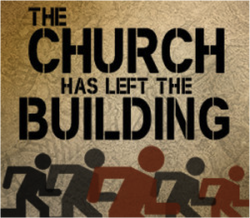
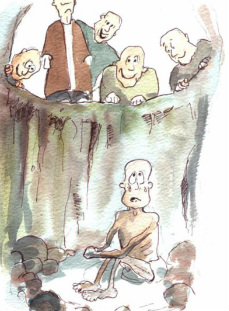
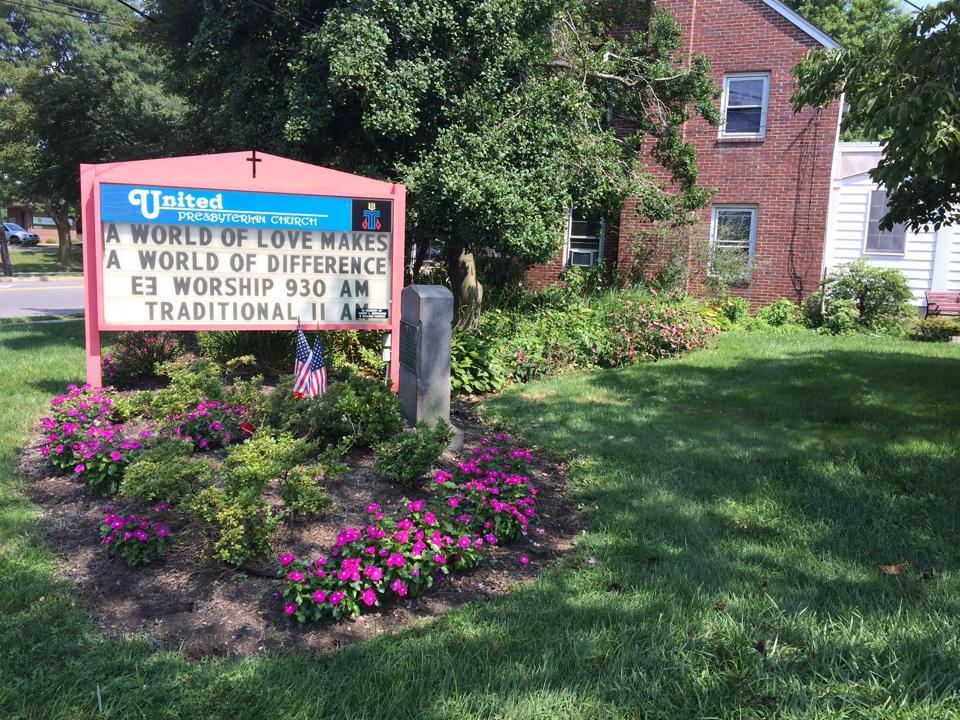
 RSS Feed
RSS Feed